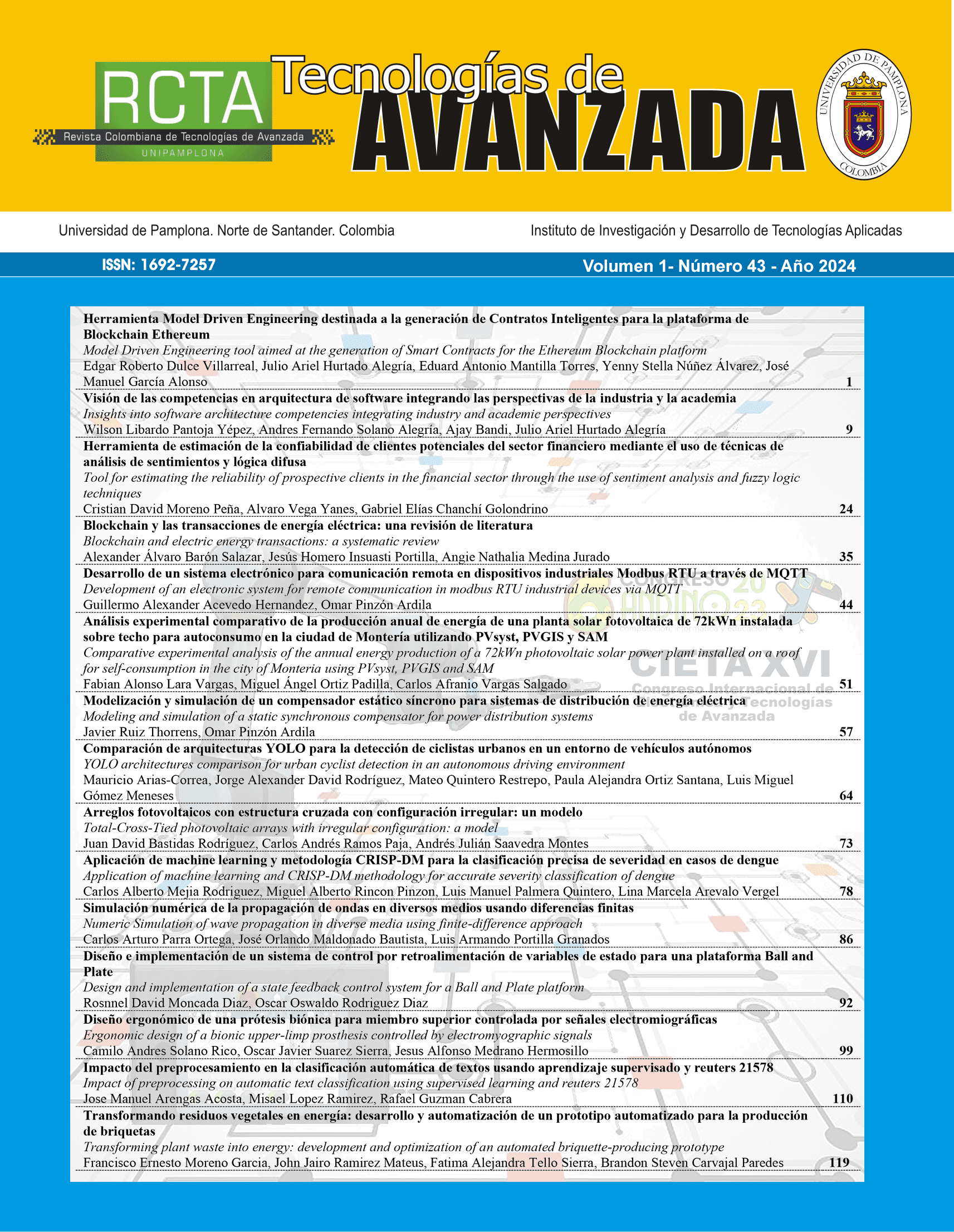Análisis experimental comparativo de la producción anual de energía de una planta solar fotovoltaica de 72kWn instalada sobre techo para autoconsumo en la ciudad de Montería utilizando PVsyst, PVGIS y SAM
DOI:
https://doi.org/10.24054/rcta.v1i43.2807Palabras clave:
Solar, Fotovoltaica, Simulación, SoftwareResumen
El presente trabajo desarrolló el análisis experimental comparativo de los datos reales de producción de energía de una planta solar fotovoltaica de 72KWn, con simulaciones hechas en PVsyst, PVGIS y SAM. El periodo de medición fue dividido entre marzo de 2021 a febrero de 2022 y de marzo de 2022 a febrero de 2023. Se encontró que la simulación desarrollada en SAM presentó el error cuadrático medio más bajo para todo el periodo de medición en comparación con PVsyst y PVGIS, presentando valores respectivos de para SAM, para PVGIS y para PVsyst. Además, se concluyó que un aumento en la temperatura ambiente puede influir en la producción de un sistema fotovoltaico, asi también el uso de bases de datos ambientales actualizadas, puede resultar en cálculos más precisos de la producción proyectada.
Descargas
Citas
V. Arun Kumar, M. Rashmitha, B. Naresh, J. Bangararaju, and V. Rajagopal, “Performance analysis of different photovoltaic technologies,” in Proceedings of the 2013 International Conference on Advanced Electronic Systems, ICAES 2013, 2013. doi: 10.1109/ICAES.2013.6659413. DOI: https://doi.org/10.1109/ICAES.2013.6659413
D. Díaz-Bello, C. Vargas-Salgado, J. Águila-León, and F. Lara-Vargas, “Methodology to Estimate the Impact of the DC to AC Power Ratio, Azimuth, and Slope on Clipping Losses of Solar Photovoltaic Inverters: Application to a PV System Located in Valencia Spain,” Sustainability, vol. 15, no. 3, 2023, doi: 10.3390/su15032797. DOI: https://doi.org/10.3390/su15032797
S. Kichou, N. Skandalos, and P. Wolf, “Floating photovoltaics performance simulation approach,” Heliyon, vol. 8, no. 12, p. e11896, Dec. 2022, doi: 10.1016/J.HELIYON.2022.E11896. DOI: https://doi.org/10.1016/j.heliyon.2022.e11896
A. Desai, T. Joshi, I. Mukhopadhyay, and A. Ray, “Effect of Temperature on Conversion Efficiency of Single-Phase Solar PV Inverter,” in Conference Record of the IEEE Photovoltaic Specialists Conference, 2021. doi: 10.1109/PVSC43889.2021.9518415. DOI: https://doi.org/10.1109/PVSC43889.2021.9518415
IDEAM, “climatología aeronáutica aerodromo los garzones skmr Monteria,” Bogota, 2013.
S. Oliveira-Pinto and J. Stokkermans, “Assessment of the potential of different floating solar technologies – Overview and analysis of different case studies,” Energy Convers Manag, vol. 211, 2020, doi: 10.1016/j.enconman.2020.112747. DOI: https://doi.org/10.1016/j.enconman.2020.112747
N. Manoj Kumar, S. Chakraborty, S. Kumar Yadav, J. Singh, and S. S. Chopra, “Advancing simulation tools specific to floating solar photovoltaic systems – Comparative analysis of field-measured and simulated energy performance,” Sustainable Energy Technologies and Assessments, vol. 52, p. 102168, Aug. 2022, doi: 10.1016/J.SETA.2022.102168. DOI: https://doi.org/10.1016/j.seta.2022.102168
E. Solomin, E. Sirotkin, E. Cuce, S. P. Selvanathan, and S. Kumarasamy, “Hybrid Floating Solar Plant Designs: A Review,” Energies (Basel), vol. 14, no. 10, p. 2751, May 2021, doi: 10.3390/en14102751. DOI: https://doi.org/10.3390/en14102751
UE, “Empezando con PVGIS,” https://joint-research-centre.ec.europa.eu/photovoltaic-geographical-information-system-pvgis/getting-started-pvgis_en.
L. Uwineza, H.-G. Kim, C. K. Kim, B. Kim, and J.-Y. Kim, “Accuracy Assessment of Typical Meteorological Year Data for a Photovoltaic System using a Bootstrap Method,” Journal of the Korean Solar Energy Society, vol. 41, no. 4, 2021, doi: 10.7836/kses.2021.41.4.115. DOI: https://doi.org/10.7836/kses.2021.41.4.115
Department of Energy, “System Advisor Model (SAM),” https://sam.nrel.gov/.
PVsyst, “PVsyst caracteristicas,” https://www.pvsyst.com/features/.
S. A. D. Mohammadi and C. Gezegin, “Design and Simulation of Grid-Connected Solar PV System Using PVSYST, PVGIS and HOMER Software,” International Journal of Pioneering Technology and Engineering, vol. 1, no. 01, 2022, doi: 10.56158/jpte.2022.24.1.01. DOI: https://doi.org/10.56158/jpte.2022.24.1.01
S. Saglam, “Meteorological parameters effects on solar energy power generation,” WSEAS Transactions on Circuits and Systems, vol. 9, no. 10, 2010.
S. Dubey, J. N. Sarvaiya, and B. Seshadri, “Temperature Dependent Photovoltaic (PV) Efficiency and Its Effect on PV Production in the World – A Review,” Energy Procedia, vol. 33, pp. 311–321, Jan. 2013, doi: 10.1016/J.EGYPRO.2013.05.072. DOI: https://doi.org/10.1016/j.egypro.2013.05.072
M. N. R. Nazeri, M. F. N. Tajuddin, T. Sudhakar Babu, A. Azmi, M. Malvoni, and N. Manoj Kumar, “Firefly algorithm-based photovoltaic array reconfiguration for maximum power extraction during mismatch conditions,” Sustainability (Switzerland), vol. 13, no. 6, 2021, doi: 10.3390/su13063206. DOI: https://doi.org/10.3390/su13063206
Descargas
Archivos adicionales
Publicado
Cómo citar
Número
Sección
Licencia
Derechos de autor 2024 Fabian Alonso Lara Vargas, Miguel Ángel Ortiz Padilla, Carlos Afranio Vargas Salgado

Esta obra está bajo una licencia internacional Creative Commons Atribución-NoComercial 4.0.















